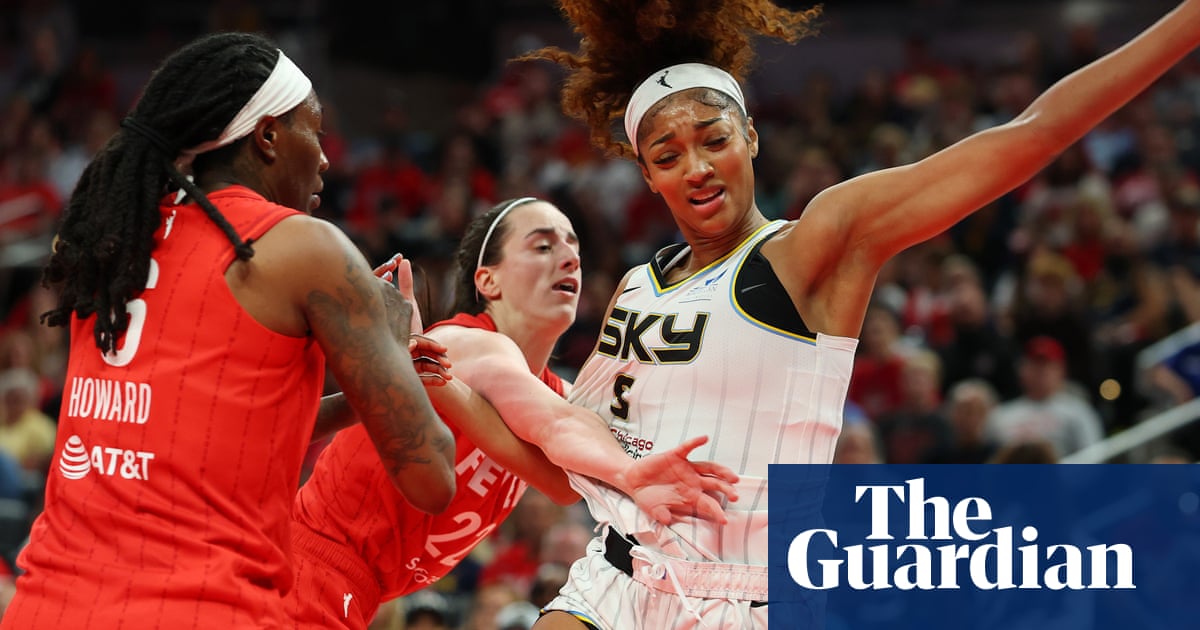Caitlin Clark and Angel Reese agreed on one thing Saturday: their dustup during the teams’ WNBA season opener was just part of basketball.Both stars downplayed the on-court fracas that occurred in the third quarter and which spurred Indiana to a 93-58 victory over the Chicago Sky. It started with Reese grabbing an offensive rebound and Clark slapping Reese’s arm hard enough to jar the ball loose and knock Reese to floor.
When Reese got up, she tried to confront Clark before Indiana center Aliyah Boston stepped in to calm tempers down. Clark’s third personal foul was upgraded to a flagrant 1 while Boston and Reese each drew technical fouls after a replay review by the referees.
“Let’s not make it something that it’s not,” Clark said after posting the third triple-double of her career. “It was just a good play on the basketball. I’m not sure what the ref saw to upgrade it, and that’s up to their discretion. It’s a take foul to put them at the free-throw line. I’ve watched a lot of basketball in my life, that’s exactly what it was. I wasn’t trying to do anything malicious. That’s not the type of player I am.”
But it was hard to ignore the obvious – that the clash added another chapter to the rivalry that has captivated women’s basketball. It dates to their college days, when Reese helped lead LSU to victory over Clark’s Iowa Hawkeyes for the 2022-23 national championship. Clark won the rematch in the spring of 2024, a game that drew 12.3 million television viewers.
Less than eight weeks later, they were squaring off in the WNBA in the first of four matchups. The Fever took three of those contests, many featuring hard foulsas the rivalry attracted online vitriol, some of it racist and sexist. In the end Clark helped Indiana make the playoffs and the Sky came up short as Reese missed the final two weeks of games with a season-ending wrist injury.Now the rivalry has restarted in the season’s opening weekend. Reese gave her own thoughts on Saturday’s incident.
“A basketball play,” she said without elaborating after scoring 12 points and grabbing 17 rebounds.
When a follow-up question was asked later in the interview, a team spokesperson said Reese had already answered the question. When Sky coach Tyler Marsh was asked about his thoughts, he paused before repeating Reese’s answer.
Indiana had a little more to say after Clark finished with 20 points, 10 rebounds, 10 assists and a career-high four blocks.
“Nobody’s going to get anything easy against us,” new Fever coach Stephanie White said. “We’re going to be a tough defensive team. I thought it was a clear play on the ball as well. One of the points of emphasis is we can’t give up. But I thought it was a clear play on the ball.”
Crew chief Roy Gulbeyan disagreed. “The foul on Clark met the criteria for flagrant foul 1, for wind up, impact, and follow through for the extension of the left hand to Reese’s back, which is deemed not a legitimate basketball play, and therefore deemed unnecessary contact,” he said. “After the foul, there is a physical taunt technical on Boston and a verbal technical on Reese, which offset.”
Boston may have been the most surprised, not even realizing she had been called for the technical until after the game. She reacted by putting her hands on her face, looking surprised and asking if she really had drawn the technical. But the calls clearly changed the game.
After Reese missed the first of two throws, Gainbridge Fieldhouse erupted in cheers. Reese made the second and Chicago added a layup on the ensuing possession to close to 56-45. Then the Fever closed the third quarter with nine straight points to extend the margin by 20 and never let Chicago get closer than 18 the rest of the way as they matched the second-largest victory margin in franchise history.
“I went for the ball, clear as day in the replay,” Clark said. “You watch it, you know it shouldn’t have been upgraded. Again that’s up to the refs’ discretion, but I appreciate AB having my back.”
